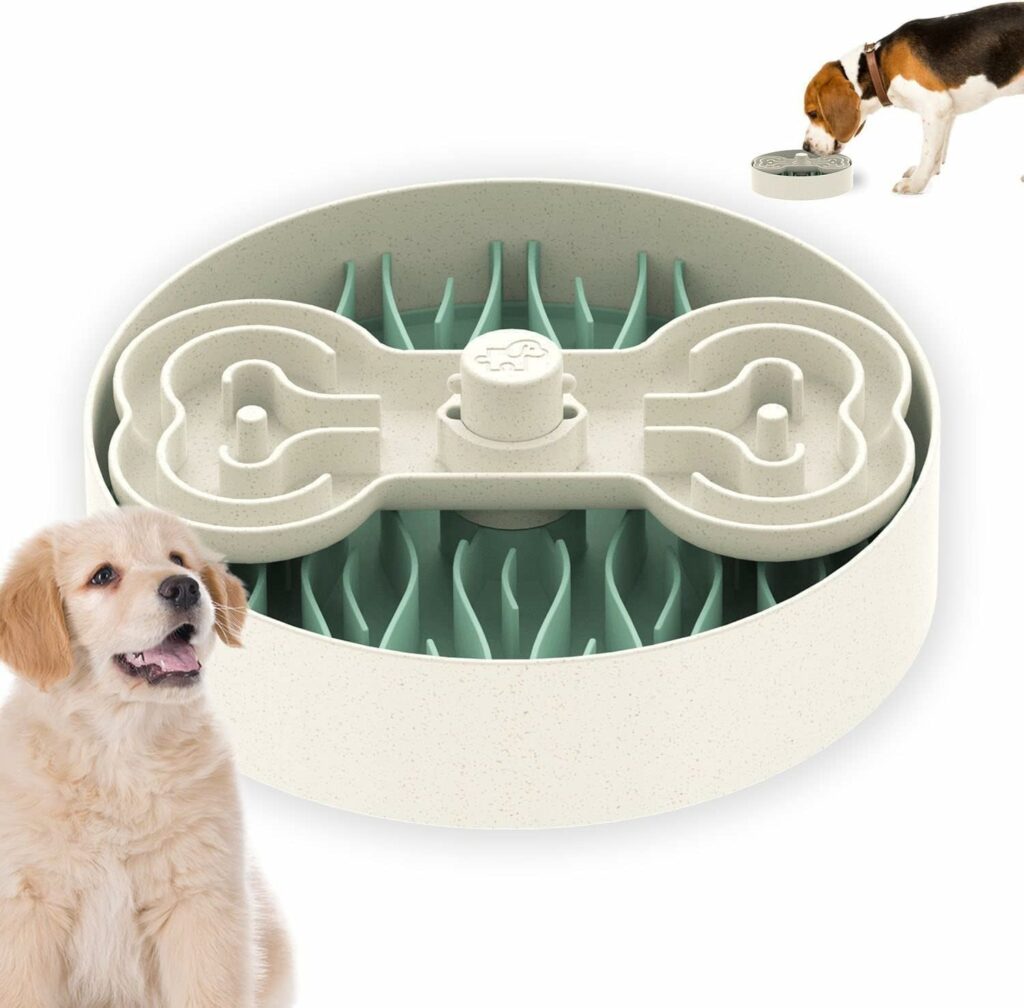Acid reflux, a common gastrointestinal issue in dogs, can cause discomfort and disrupt their daily routines. Just like humans, dogs can experience this condition, leading to symptoms like regurgitation, vomiting, and reluctance to eat. While managing acid reflux in dogs requires a comprehensive approach involving veterinary care, dietary adjustments play a crucial role in alleviating symptoms and promoting digestive health. When you feed a dog with acid reflux, it’s important to understand why some foods trigger this condition more than others. In this post I will cover:
- How to feed a dog with acid reflux
- The symptoms of reflux in dogs
- Reasons why some dogs get reflux
- Natural Reflux Remedies
- If Tums can be given to dogs

Acid Reflux in Dogs Symptoms
A dog with acid reflux or “GERD” may be uncomfortable. If you’ve ever had heartburn, you know the feeling! Uncomfortable dogs may be fearful, snappy, short-tempered, or even aggressive. Always see your veterinarian if new behaviors or health issues pop up.
Here are some signs that your dog might have acid reflux:
- Regurgitation: Your dog may bring up food or liquid, often soon after eating, without any effort or warning.
- Vomiting: While similar to regurgitation, vomiting involves active abdominal contractions, and it may include partially digested food or bile.
- Burping or excessive belching: Your dog may make unusual burping sounds more frequently than usual.
- Difficulty swallowing: You may notice your dog hesitating before swallowing or showing signs of discomfort while eating.
- Excessive salivation: Dogs with acid reflux may drool more than usual, especially during or after meals.
- Heartburn: Dogs may exhibit signs of discomfort or pain in the chest or abdomen, which could be associated with heartburn.
- Loss of appetite: If your dog experiences discomfort when eating due to acid reflux, they may lose interest in food.
- Weight loss: Persistent acid reflux can lead to weight loss over time, as the dog may avoid eating to avoid discomfort.
- Coughing or gagging: Acid reflux can irritate the throat, leading to coughing or gagging, especially after eating or drinking.
- Bad breath: Stomach acid backing up into the esophagus can contribute to foul-smelling breath in dogs with acid reflux.
It’s important to note that these symptoms can also indicate other health issues, so if you suspect your dog has acid reflux, it’s best to consult with a veterinarian for proper diagnosis and treatment.

What Causes Acid Reflux in Dogs?
Acid reflux in dogs, also known as gastroesophageal reflux disease (GERD), can have various causes. It’s important to talk to your veterinarian if you are concerned about your dog having reflux or any kind of digestive problem.
Here are some common factors that contribute to acid reflux in dogs:
- Dietary Factors: Certain foods can trigger acid reflux in dogs, especially high-fat foods. Dogs that get into the trash or that are fed a lot of fatty, spicy, or salty human foods may have reflux too.
- Fast Eating & Big Meals: Dogs that eat large meals, or that eat lots of food quickly, are more likely to suffer from reflux.
- Anatomy: Dogs with certain anatomical features, such as short noses (brachycephalic breeds like Bulldogs and Pugs) or a hiatal hernia (a condition where part of the stomach protrudes through the diaphragm), may be more prone to acid reflux.
- Obesity: Overweight dogs are at a higher risk of developing acid reflux due to increased pressure on the stomach, which can cause stomach contents to flow back into the esophagus.
- Underlying Health Conditions: Acid reflux can be a symptom of underlying health issues such as gastrointestinal disorders (e.g., gastritis, inflammatory bowel disease), esophageal abnormalities, or certain infections.
- Medications: Some medications, such as non-steroidal anti-inflammatory drugs (NSAIDs) or certain antibiotics, can irritate the stomach lining and increase the risk of acid reflux.
- Stress and Anxiety: Dogs experiencing stress or anxiety may have altered digestive function, leading to increased acid production and reflux.
- Positioning: Sleeping or resting in certain positions, particularly with the head lower than the stomach, can promote acid reflux in dogs.
- Exercise After Meals: Intense physical activity immediately after eating can contribute to acid reflux by putting pressure on the stomach and causing its contents to back up into the esophagus.

What To Feed a Dog With Acid Reflux
When feeding a dog with acid reflux, it’s crucial to focus on easily digestible and nutritious foods that won’t exacerbate their condition.
For dogs with extreme cases of acid reflux, a therapeutic veterinary diet may be warranted. Talk to your veterinarian for a recommendation. They may recommend foods such as Royal Canin Veterinary Diet Adult Gastrointestinal Low Fat Dry Dog Food or Hill’s Prescription Diet Gastrointestinal Biome Chicken Flavor Dry Dog Food to help your pet with digestive problems and reflux.
When choosing a pet food from a pet store that doesn’t require a veterinary authorization, prioritize brands such as Purina, Hill’s Science Diet, and Royal Canin that meet WSAVA recommendations.
Author’s Note – I speak from personal experience when I say that switching from boutique foods to Purina Pro Plan completely resolved my dog’s acid reflux!
There is a lot of science behind the major brands. The truth is, that many “boutique” and “holistic” foods have too many unnecessary nutrients and not enough balance. They can be very rich, leading to digestive upset and yes, reflux!
In addition to assessing your pup’s diet, soaking the kibble and encouraging slow, stress-free eating can help, too. I like this slow feeder, which is trending on TikTok for good reason!
Slow Feeder Dog Bowl
This slow feeder bowl comes apart for easy cleaning. Your dog will have to spin the bone around and nose around in the “grass” to get their food out.
Dishwasher safe!
Avoid adding fatty toppers and foods that can upset their digestive system. Raw food, for example, tends to be high in fat and can contain pathogens and bacteria that irritate your dog’s stomach. Goat’s milk is also high in fat.
By focusing on easily digestible, well-formulated foods, you can help manage your dog’s acid reflux and promote better digestive health.

Dog Acid Reflux Natural Remedies
Natural remedies may, in some situations, help manage acid reflux in dogs, but it’s important to note that they may not be sufficient for severe cases or underlying medical conditions.
Here are some natural remedies you can try:
- Dietary Modifications: Adjust your dog’s diet to include well-balanced, scientifically formulated foods. Consider feeding smaller, more frequent meals to prevent overloading the stomach. Avoid known trigger foods like fatty or spicy items.
- Probiotics: Probiotic supplements can promote gut health and balance the digestive system, potentially reducing episodes of acid reflux. Choose a high-quality probiotic specifically formulated for dogs. I like Purina FortiFlora or Nutramax Labs Proviable.
- Weight Management: If your dog is overweight, helping them achieve and maintain a healthy weight can reduce the risk of acid reflux episodes. Ensure they get regular exercise and a balanced diet.
- Stress Reduction: Stress and anxiety can exacerbate acid reflux symptoms. Provide a calm environment for your dog and consider activities like regular walks, interactive play, or training to help alleviate stress.
Before trying any natural remedies, it’s essential to consult with your veterinarian to ensure they are safe and appropriate for your dog’s specific situation. They can provide guidance on the proper dosages and help rule out any underlying medical conditions contributing to acid reflux.

Can Dogs Have Tums for Reflux?
While Tums (calcium carbonate) are generally safe for occasional use in dogs to alleviate mild stomach upset, they are not typically recommended for treating acid reflux in dogs without consulting a veterinarian first.
While calcium carbonate can help neutralize stomach acid, it’s important to use caution as excessive calcium intake can lead to issues like constipation or even kidney stones in some cases.
Additionally, Tums may not address the underlying cause of the acid reflux, and other treatment options may be more appropriate depending on the severity and cause of the reflux.
Always consult with your veterinarian before giving any medication, including over-the-counter remedies like Tums, to your dog, to ensure it is safe and appropriate for their specific situation.





